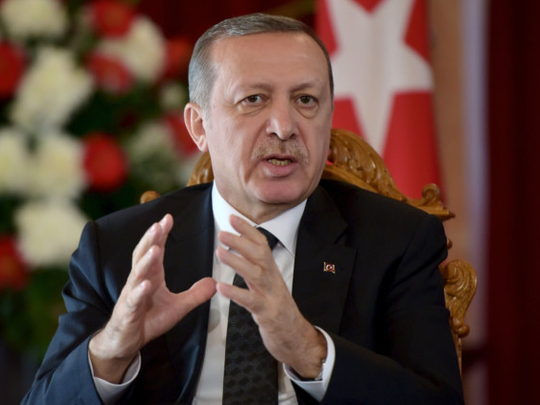
Last week, Turkey was bombing Kurdish fighters it regards as terrorists near its border with Iraq. It was doing so just as US air strikes aimed to relieve combatants from essentially the same Kurdish faction who were under terrorist siege from Daesh (Islamic State of Iraq and the Levant) in Kobani, over Turkey’s border with Syria.
This week, Ankara U-turned. After the US resupplied the desperate defenders of Kobani with airdrops of arms, ammunition and medicine, Turkey — under domestic and international pressure — lifted its ban on Iraqi Kurdish fighters crossing Turkish territory to reinforce their Syrian brethren.
To make sense of this confused policy, Turkey’s President Recep Tayyip Erdogan could argue that he is distinguishing between allied and enemy Kurds: His government has long had a collaborative relationship with the quasi-independent Kurdistan Regional Government in northern Iraq, but it is still blocking fighters from the Kurdistan Workers’ Party (PKK), a bitter enemy, from crossing to Kobani.
Yet, even this neat distinction is muddied by the fact that Erdogan’s aides are still talking to jailed PKK leader Abdullah Ocalan in an effort to end the group’s 30-year war against the Turkish state. They relied on his intervention to defuse Kurdish protests over Kobani that spread like wildfire over southeast Turkey this month.
However, Turkey spins its policy, it faces two huge risks: A possible collapse of Erdogan’s Kurdish peace initiative, the first serious effort by the Turkish republic to address the demands of the Kurds who comprise about a fifth of its population; and the likelihood of reprisals by Daesh on Turkish territory, using the networks it built while the Erdogan government allowed jihadi volunteers to cross Turkey into Syria to fight in the civil war against the regime of Bashar Al Assad.
Turkey is seen by its Nato allies as a lukewarm late-comer to the US-led coalition against Daesh. Ankara understandably resents being pushed to intervene on the ground when its partners have ruled out sending their own ground troops. It questions what an air campaign alone can do to dislodge Isis from the huge swaths of territory it holds in both Syria and Iraq.
Instead, it is pushing for a no-fly zone to create a security buffer in Syrian territory where rebels can be trained. It also wants a coalition commitment to target the Assad regime. It received little response.
Turkey views the Syrian regime as a principal source of the problem. Indeed, as long as the Al Assad clique remains in place, it will be impossible to re-energise mainstream Sunni opposition to the minority dictatorship and put it together with the less compromised elements of the regime in alliance against Isis.
Turkish officials also question the reliability of the US and its allies. After the first Gulf war in 1991, Ankara was left to cope alone with a huge Kurdish refugee inflow despite the then coalition’s no-fly zone in north Iraq. And it has watched Iraq disintegrate after the US-led invasion of 2003 unleashed sectarian carnage.
However, Turkey’s allies have their own doubts. They wonder if Erdogan and his prime minister, former foreign minister Ahmet Davutoglu, have relinquished their ambition to create a zone of Sunni Islamist influence across Arab lands in turmoil. Certainly they question their priorities — and timing.
Invincible at the ballot box in the face of an inept opposition increasingly identified with Turkey’s large heterodox Shiite Alevi minority, Erdogan’s tone has become markedly more Sunni — dissolving Turkey’s antibodies against the sectarianism raging to its south.
Ankara’s attitude towards Kobani — and Erdogan’s equation of its PKK-affiliated defenders to Daesh — risks reigniting Turkey’s conflict with its own Kurds, when its most viable buffers against Daesh are self-governed Iraqi Kurdistan and the emerging Kurdish entity in Syria.
Ultimately, the calculated and doctrinal barbarity of Daesh towards all minorities — including the Kurds — may become a catalyst legitimising an independent Kurdistan. If so, the fallout will show scant respect for the increasingly notional borders of the Levant.
As a veteran former Turkish diplomat puts it, “the primary result of [Daesh] is that it increases sympathy for the establishment of an independent Kurdish state”, which will bring “further bloodshed to this region”. That, he says, will have huge reverberations inside Turkey, which “is turning into a little Syria itself”.
— Financial Times










